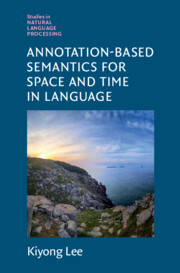Book contents
- Frontmatter
- Dedication
- Contents
- Foreword by James Pustejovsky
- Preface
- Acknowledgements
- Part I Fundamentals
- Part II Time and Events
- 7 Temporal Ontology
- 8 Normalizing TimeML with Some Modifications
- 9 Extending the Range of Temporal Annotation
- 10 Proper Interpretation of Temporal Relators
- Part III Motion, Space, and Time
- References
- Index
7 - Temporal Ontology
from Part II - Time and Events
Published online by Cambridge University Press: 05 August 2023
- Frontmatter
- Dedication
- Contents
- Foreword by James Pustejovsky
- Preface
- Acknowledgements
- Part I Fundamentals
- Part II Time and Events
- 7 Temporal Ontology
- 8 Normalizing TimeML with Some Modifications
- 9 Extending the Range of Temporal Annotation
- 10 Proper Interpretation of Temporal Relators
- Part III Motion, Space, and Time
- References
- Index
Summary
Viewing ontology as a science of things, this chapter treats times as real objects in the world. Such a view of ontology of times, called temporal ontology, conforms to Neo-Davidsonian semantics and to the type-theoretic semantics, which treats time points as one of the basic types that include individual objects, events, and spatial points. It is thus designed to provide a sound basis for the development of a semantics for the annotation and interpretation of event-based temporal information in language. In this chapter, I first introduce OWL-Time ontology which classifies temporal entities into instances and intervals. I then introduce an interval temporal calculus with 13 base relations over time points and intervals. I also discuss how eventualities are temporalized to be treated as denoting time intervals. Eventualities are then temporally related to times. To apply the notions of time points and intervals to the interpretation of tenses and aspects of language, especially the progessive aspect and the present perfective aspect, I define the notion of neighborhood and apply it to the definition of the present perfect as denoting the neighborhood of the present moment.
- Type
- Chapter
- Information
- Annotation-Based Semantics for Space and Time in Language , pp. 183 - 207Publisher: Cambridge University PressPrint publication year: 2023

